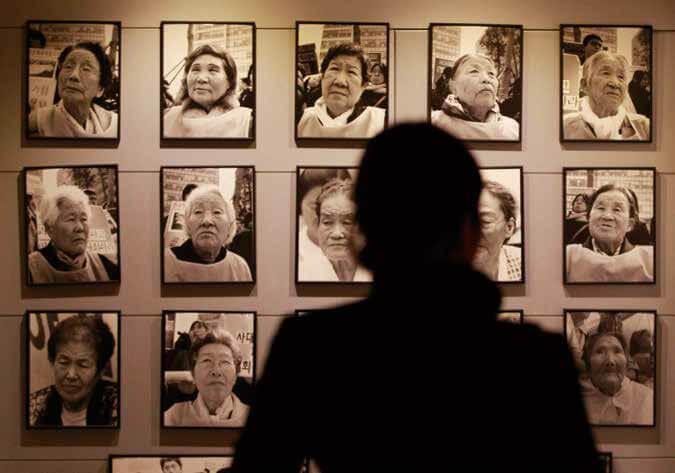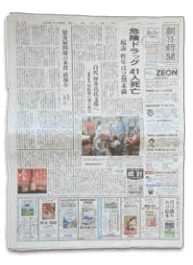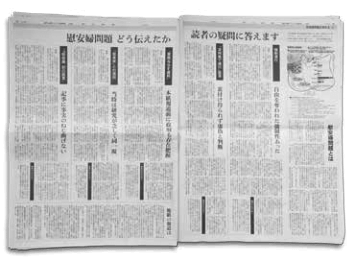Issue:
The Asahi Shimbun this month retracted some of its core historical coverage of the comfort women issue, a long expected but still stunning admission of editorial failure. Can the paper recover from the damage?

Nobody knows what Seiji Yoshida really did during World War II. A sort of reverse Walter Mitty, Yoshida wrote a confessional memoir called Watashi no Senso Hanzai (“My War Crimes”) detailing his role in rounding up 200 women on Jeju Island for Japanese military brothels. In the 1980s, all the big Japanese daily newspapers wrote about his sensational claims. The problem is, they weren’t true.
The Asahi newspaper, true to its reputation for liberal journalism, gave Yoshida more space than most. Starting in September 1982, Yoshida was featured in over a dozen articles through to the 1990s, by which time historians had smelled a rat. By the time of his death in 2000, his story was widely considered bogus, even among Korean and Japanese scholars on the left.
But it wasn’t until Aug. 5 of this year that the Asahi finally came clean, retracting 16 articles and running a two page spread explaining its decision. “We have judged that Mr.Yoshida’s statement, in which he said that he took comfort women by force from Jeju Island, was fake,” it told its 20 million readers. The newspaper had been “unable to see through” Yoshida’s “fraudulent testimony,” it admitted ruefully.
The Asahi did its best to minimize the fallout, publishing the admission during the Obon holidays to avoid being savaged by Japan’s right wing weekly magazines. The reaction from those who have long disputed claims of organized military involvement in rounding up “comfort women,” however, was swift and predictable.
Conservatives took to the airwaves the day after to gloat over the humbling of Japan’s liberal flagship. An editorial in the Yomiuri newspaper said the Asahi’s coverage had helped fuel anti Japan sentiment in South Korea, and was the basis of “misperception of Japan” throughout the world. It again demanded a retraction of the 1993 Kono Statement (named after then Chief Cabinet Secretary Yohei Kono) admitting organized military involvement in rounding up the sex slaves.
Prime Minister Shinzo Abe told the Sankei newspaper, which has led a two decade campaign against the Kono Statement, that “many people had suffered” because of the Asahi’s reporting. Shigeru Ishiba, the secretary general of the ruling Liberal Democrats, said the Diet might have to “discuss” the Asahi’s reporting. Many conservatives called for a nation wide boycott of the newspaper.
Right wing critics trace the pitched political battles over the comfort women issue back to the Asahi’s coverage, and by extension blame the newspaper for Japan’s diplomatic deep freeze with South Korea. Takaaki Mizuno, a veteran Asahi correspondent who now teaches at Kanda University of International Studies, scoffs at that view. He points out that there were many soldiers’ accounts predating Yoshida’s memoir.
“I always say, Japanese journalists should be ashamed that we didn’t report it until 1991,” Mizuno says. “It is common sense that there were other accounts because there were so many former soldiers with experience of ianfu (comfort women).” He says that’s why so many ordinary Japanese people contributed up to $6 million to the 1995 compensation fund, which was set up by Japan following the Kono investigation. “They felt guilty about what happened, and sympathy toward the women,” he says.
In 1997 the Asahi tentatively admitted it could not verify Yoshida’s testimony. At least one former journalist closely associated with the paper’s coverage was hounded out of an academic position in Kobe and now lives and teaches in distant Hokkaido. That might explain why the Asahi is reluctant to officially explain the background to the retraction, though some journalists at the paper agreed to discuss it off the record.


According to one editor, the Asahi dispatched reporters to Jeju to retrace Yoshida’s account, essentially a formality before so much doubt had already been sown. The issue, he said, had clearly become an impediment to reporting at the newspaper. “Readers were calling in and asking us about it. Journalists were being questioned about it repeatedly on reporting assignments,” he recalls.
Eventually, under pressure from revisionists in the Abe government, something had to give. “The Sankei was running articles about this once a week,” says the editor. The Yomiuri too had become more aggressive. “We felt we were being pushed into a corner.” The departure of most of the reporters and senior editors who had been associated with the comfort women coverage provided the opportunity for a clean break.
In August, the newspaper’s senior management rounded up midlevel editors and said the paper was going to bite the bullet. “They were told that it couldn’t be avoided any more,” says the editor. The reaction, he says, was “relief.” Morale was high, despite the inevitable blow to the paper’s prestige. “It was good to have it solved,” he says, but admits: “It should have been done much earlier.”
There are few precedents for such a high profile mea culpa. In 1989 the Asahi was forced to apologize after admitting that one of its photographers had defaced a coral reef near Okinawa. The newspaper had used the incident as a pretext to launch a crusade against environmental vandalism.
Perhaps the biggest postwar newspaper scandal involved the Mainichi. In 1972 its reporter Takichi Nishiyama obtained proof that Japan had secretly agreed to absorb $4 million in costs for the reversion of Okinawa to Japanese rule. Nishiyama was convicted of revealing state secrets, sacked and hounded from his profession. In 2006 the Mainichi finally claimed vindication when a retired senior diplomat with the Ministry of Foreign Affairs confirmed the secret transaction.
The Nishiyama episode is often cited as an example of how the Japanese state successfully deflected a potentially serious political scandal by blaming the messenger. Some analysts see parallels in the Yoshida case, which they say has also been skillfully used by conservatives to deflect from the larger discussion about war crimes.
“Abe and the government knew this was a weakness and they exerted all their pressure on the Asahi,” says Kaori Hayashi, a media specialist at the University of Tokyo. She says the government has worked hard to bring the Yomiuri, the Sankei and even state broadcaster NHK onside on the issue. “They have now got rid of the Asahi as a problem.”
Editors at the Asahi say they hope the Aug. 5 review will draw a line under the Yoshida episode and clear the way for a more mature public discussion about the comfort women issue. But Koichi Nakano, a political scientist at Sophia University, says that’s unlikely. “It’s going to provide ammunition for both camps and polarize the issue further,” he says.
“The people who want to look at the facts would say, ‘Well, the Asahi went wrong there but the understanding of the comfort women is not affected by this review,’” Nakano says. “But it gave more ammunition to right wingers, who pick whatever argument suits their purposes.” Mizuno agrees. “What conservatives are trying to do is not just target the Asahi,” he says. “Their real target is Kono, [former Prime Minister Kiichi] Miyazawa and liberals in the LDP.”
The bottom line, say most, is that the Asahi’s retraction has added a great deal of momentum to the push to reverse the Kono Statement. A few days after the admission, about 40 LDP lawmakers, led by Keiji Furuya, chairman of the National Public Safety Commission, met to pressure the government into releasing a new statement.
The decision in the mid 1990s to include references to wartime sex slaves in Japanese high school textbooks was the trigger for a backlash among Abe, Furuya and other conservatives, who formed a Diet lobby group to remove them (Abe has been careful to distance himself from the group but is still a core advisor). A rewrite or retraction of the statement, probably on the 50th anniversary of the normalization of diplomatic relations between Japan and South Korea next year would be considered a major political victory.
“We would like to wrap up our discussions in a way that a new statement could be issued based on new facts,” Koichi Hagiuda, acting secretary general of the group, told the Yomiuri. Any attempt to tamper with one of the core documents of Japan’s postwar Asian diplomacy is likely to have explosive consequences, but that is unlikely to deter the LDP conservative wing, says Mizuno.
“The problem is that right wingers don’t care about facts.”
David McNeill writes for The Independent, The Economist, The Chroni cle of Higher Education and other publications.

